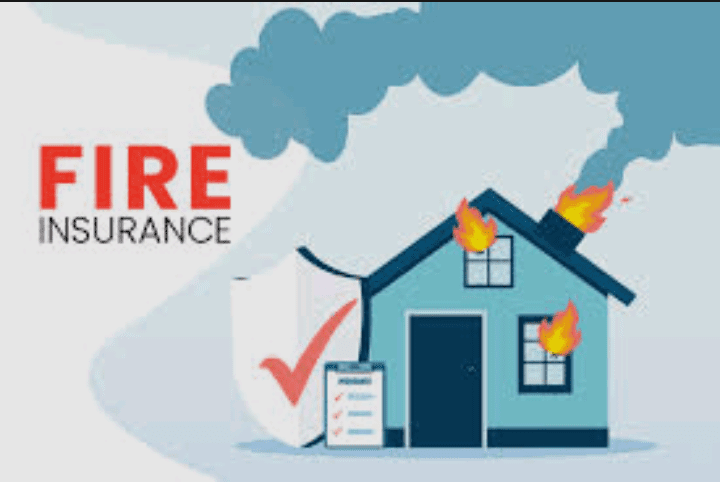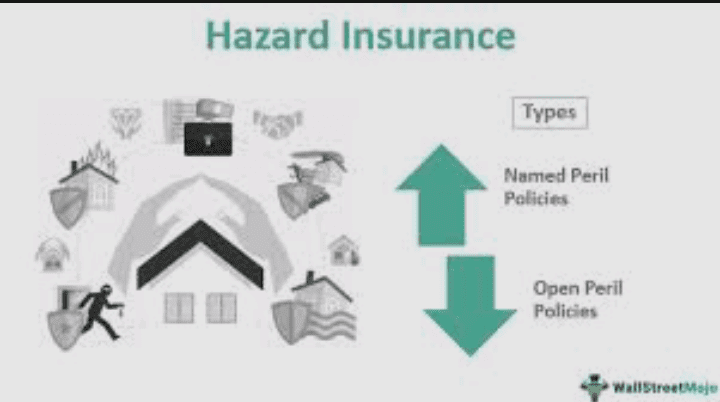Hazard insurance is a type of insurance policy that provides financial protection to homeowners in the event of damage or loss caused by certain types of hazards.
These hazards can include natural disasters such as fires, earthquakes, floods, and hurricanes, as well as man-made disasters such as theft, vandalism, and other accidents.
The purpose of hazard insurance is to protect homeowners from financial losses that can occur due to these hazards. If you have a mortgage on your home, your lender may require you to have hazard insurance to protect their investment in your property.
Even if you own your home outright, it’s still a good idea to have hazard insurance to protect your investment and your assets.
Hazard insurance typically covers the structure of your home and any other structures on your property, such as a garage or shed. It can also cover your personal property, such as furniture, appliances, and other belongings. Some policies may also provide liability coverage in case someone is injured on your property.
When purchasing hazard insurance, it’s important to read the policy carefully and understand what is covered and what is not. Some policies may exclude certain types of hazards, such as floods or earthquakes, and you may need to purchase additional coverage for those risks.
It’s also important to understand the deductible, which is the amount you will need to pay out of pocket before your insurance coverage kicks in.
To determine the appropriate amount of coverage, you will need to consider the cost to rebuild your home and replace your belongings in the event of a total loss.
This can be difficult to estimate, so it’s important to work with a qualified insurance agent who can help you determine the appropriate coverage for your needs.
In addition to hazard insurance, homeowners may also need to consider other types of insurance, such as flood insurance, earthquake insurance, and liability insurance.
These policies provide additional protection for specific risks that may not be covered under a standard hazard insurance policy.
Hazard insurance is an important form of protection for homeowners that provides financial security in the event of a loss caused by certain types of hazards.
By understanding the coverage and working with a qualified insurance agent, homeowners can ensure that they have the appropriate level of protection for their needs.
Read Also: 10 Things You Must Do to Be Successful in Business (and in Life)
Fire Insurance

Fire insurance is a type of insurance policy that provides financial protection to individuals, businesses, and organizations in the event of fire damage to their property. The policyholder pays a premium to the insurance company, which, in turn, agrees to provide coverage for losses resulting from fire.
The importance of fire insurance cannot be overstated, particularly in areas that are prone to wildfires or other types of fires.
Fire insurance policies typically cover damage caused by fire, smoke, and other related perils, such as lightning strikes, explosions, and water damage from firefighting efforts. Some policies may also cover additional hazards, such as theft or vandalism.
Fire insurance policies can vary widely in their coverage and terms, depending on the specific needs of the policyholder. For instance, some policies may cover only the cost of repairing or rebuilding damaged property, while others may also provide compensation for lost income or additional living expenses incurred as a result of the fire.
Before purchasing fire insurance, it is important to carefully review the terms of the policy and ensure that it provides adequate coverage for your needs. This may involve consulting with an insurance agent or broker to help you understand the specific terms and limitations of the policy.
One key factor to consider when purchasing fire insurance is the policy’s deductible. The deductible is the amount of money that the policyholder must pay out of pocket before the insurance company will begin paying for any covered losses. Generally speaking, policies with higher deductibles will have lower premiums, but they may also provide less coverage overall.
Another important consideration when purchasing fire insurance is the amount of coverage provided. It is important to ensure that the policy provides enough coverage to fully rebuild or replace any damaged property, as well as to cover any additional expenses that may arise as a result of the fire.
Finally, it is important to review the policy periodically to ensure that it continues to meet your needs over time. This may involve updating your coverage limits or adjusting your deductible to reflect changes in your financial situation or the value of your property.
Fire insurance is an essential form of financial protection for anyone who owns property or operates a business.
By carefully reviewing your insurance options and selecting a policy that provides adequate coverage, you can help ensure that you are prepared for the unexpected and can quickly recover from any fire-related losses.
Flood Insurance
Flood insurance is a type of insurance that protects homeowners and business owners from financial loss due to flood damage. Floods can cause extensive damage to homes and buildings, destroying personal belongings, causing structural damage, and in severe cases, even leading to loss of life.
Flood insurance policies provide coverage for both structural damage and personal property damage caused by flooding. This type of insurance is typically required by mortgage lenders in high-risk flood zones, but it is important to note that even those outside of high-risk areas can experience flooding.
What is Flood Insurance?
Flood insurance is a specialized insurance policy designed to protect homeowners and business owners from financial loss caused by flooding. Flood insurance policies are backed by the Federal Emergency Management Agency (FEMA), and they are available to homeowners and renters, as well as business owners.
It is important to note that flood damage is not typically covered by standard homeowners insurance policies. This means that if your home or business is located in a flood-prone area, you may need to purchase separate flood insurance coverage to ensure that you are protected in the event of a flood.
What does Flood Insurance Cover?
Flood insurance policies typically cover two types of damage:
Structural Damage: This includes damage to the physical structure of your home or business, such as the foundation, walls, and floors.
Personal Property Damage: This includes damage to personal belongings, such as furniture, appliances, and clothing.
Flood insurance policies typically have two types of coverage limits:
Building Coverage: This covers the physical structure of your home or business, up to a certain amount.
Contents Coverage: This covers the personal belongings within your home or business, up to a certain amount.
It is important to note that flood insurance policies typically have exclusions and limitations. For example, certain types of personal property may not be covered, such as currency, valuable papers, and art collections. Additionally, flood insurance policies may not cover damage caused by landslides, sewer backups, or wind-driven rain.
Who Needs Flood Insurance?
Flood insurance is recommended for anyone living in a flood-prone area. Even if you are not required to have flood insurance by your mortgage lender, it is still a good idea to consider purchasing a policy to protect your home or business in the event of a flood.
To determine if you are in a high-risk flood zone, you can check FEMA’s Flood Map Service Center. It is important to note that even those living outside of high-risk areas can experience flooding, and that flood insurance policies can be affordable even for those living in moderate to low-risk areas.
How to Purchase Flood Insurance
Flood insurance policies can be purchased through private insurance companies or through the National Flood Insurance Program (NFIP), which is administered by FEMA. To purchase a policy through the NFIP, you can contact a participating insurance agent in your area.
It is important to note that there is typically a 30-day waiting period before flood insurance coverage takes effect, so it is important to purchase coverage well in advance of any potential flood events.
Floods can cause extensive damage to homes and businesses, and flood insurance can provide important financial protection for homeowners and business owners.
While flood insurance may not be required in all areas, it is still a good idea to consider purchasing a policy to ensure that you are protected in the event of a flood. To purchase flood insurance, you can contact a participating insurance agent or visit the NFIP website to learn more.
Read Also: Navigating the World of Health Insurance: A Guide for Beginners
Earthquake Insurance
Earthquake insurance is a type of insurance policy that provides financial protection against damages and losses caused by earthquakes. This type of insurance is essential for people who live in areas prone to earthquakes.
Earthquakes are a natural disaster that can strike without warning, and the damage they cause can be devastating. Earthquake insurance can provide peace of mind and financial security during a difficult time.
Earthquake insurance policies typically cover damage to the insured property, including the dwelling, personal property, and other structures on the property. The policy may also cover additional living expenses if the insured property is uninhabitable due to earthquake damage.
This coverage can provide financial assistance to pay for temporary housing and other necessary expenses while the insured property is being repaired or rebuilt.
It is important to note that earthquake insurance is not included in standard homeowners or renters insurance policies.
It is a separate policy that must be purchased separately. The cost of earthquake insurance varies depending on several factors, including the location and value of the insured property, the level of coverage, and the insurance company.
One important consideration when purchasing earthquake insurance is the deductible. This is the amount the policyholder must pay out of pocket before the insurance coverage begins.
Deductibles for earthquake insurance can be much higher than those for standard homeowners insurance. This is because earthquakes are rare but can cause extensive damage when they do occur.
Policyholders should carefully consider their deductible when purchasing earthquake insurance and ensure that they have sufficient savings to cover the cost if an earthquake does occur.
Another important consideration when purchasing earthquake insurance is the coverage limit. This is the maximum amount the insurance company will pay for earthquake damage.
Policyholders should carefully consider the value of their property and the potential cost of earthquake damage when selecting a coverage limit.
In some cases, earthquake insurance may not be necessary. If the insured property is located in an area with low seismic activity, the risk of earthquake damage may be minimal. However, it is important to consider the potential risk and the financial impact of earthquake damage when making this decision.
Earthquake insurance can provide important financial protection for property owners in earthquake-prone areas.
While it is not included in standard homeowners or renters insurance policies, it is a separate policy that can provide peace of mind and financial security in the event of an earthquake.
Policyholders should carefully consider their deductible and coverage limit when purchasing earthquake insurance and ensure that they have sufficient savings to cover the cost if an earthquake does occur.
Read Also: How to Treat the Soil for Snail (Soil Treatment for Snail Farming)
